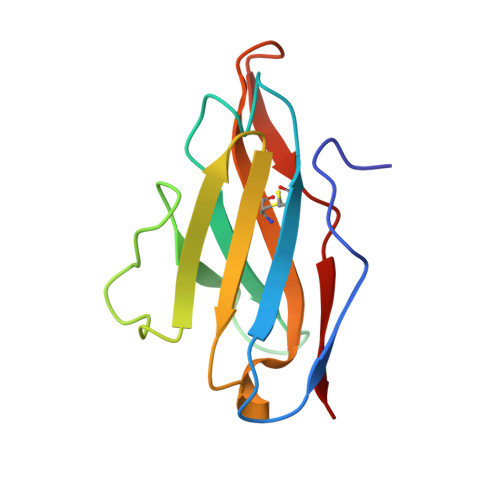Differences in Protein Concentration Dependence for Nucleation and Elongation in Light Chain Amyloid Formation.
Blancas-Mejia, L.M., Misra, P., Ramirez-Alvarado, M.(2017) Biochemistry 56: 757-766
- PubMed: 28074646
- DOI: https://doi.org/10.1021/acs.biochem.6b01043
- Primary Citation of Related Structures:
5T93 - PubMed Abstract:
Light chain (AL) amyloidosis is a lethal disease characterized by the deposition of the immunoglobulin light chain into amyloid fibrils, resulting in organ dysfunction and failure. Amyloid fibrils have the ability to self-propagate, recruiting soluble protein into the fibril by a nucleation-polymerization mechanism, characteristic of autocatalytic reactions. Experimental data suggest the existence of a critical concentration for initiation of fibril formation. As such, the initial concentration of soluble amyloidogenic protein is expected to have a profound effect on the rate of fibril formation. In this work, we present in vitro evidence that fibril formation rates for AL light chains are affected by the protein concentration in a differential manner. De novo reactions of the proteins with the fastest amyloid kinetics (AL-09, AL-T05, and AL-103) do not present protein concentration dependence. Seeded reactions, however, exhibited weak protein concentration dependence. For AL-12, seeded and protein concentration dependence data suggest a synergistic effect for recruitment and elongation at low protein concentrations, while reactions of κI exhibited poor efficiency in nucleating and elongating preformed fibrils. Additionally, co-aggregation and cross seeding of κI variable domain (V L ) and the κI full length (FL) light chain indicate that the presence of the constant domain in κI FL modulates fibril formation, facilitating the recruitment of κI V L . Together, these results indicate that the dominant process in fibril formation varies among the AL proteins tested with a differential dependence of the protein concentration.
Organizational Affiliation:
Department of Biochemistry and Molecular Biology and ‡Department of Immunology, Mayo Clinic , Rochester, Minnesota 55905, United States.
















